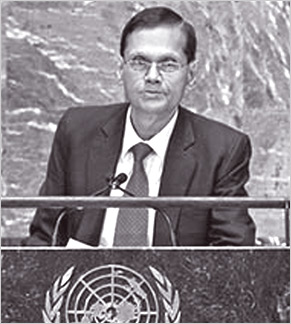‘West’s recovery plans should help developing world’
Text of address to the General Debate of the
67th Session of the United Nations General Assembly by External Affairs
Minister Prof. G. L. Peiris
On behalf of the government of the Democratic Socialist Republic of
Sri Lanka, I congratulate Your Excellency, on your election as the
President of the 67th Session of the UN General Assembly.
|

External Affairs Minister Prof. G. L. Peiris |
Your proven skills and charming personality leave no room for doubt,
that under your able leadership we will achieve our goals for this
session.
Sri Lanka is also pleased to endorse the theme proposed by you for
this year’s high-level debate 'Adjustment or settlement of international
disputes or situations by peaceful means in the multilateral global
governance system' - a most appropriate theme in these trying times.
The United Nations has provided the premier forum for 67 years for
the resolution of international disputes and the negotiation of landmark
global goals. In fact, many conflicting aspirations of Member States
have been reconciled through the intervention of the United Nations or
through the auspices of this august body and its agencies. Some
disputes, unfortunately, have taken time to resolve, or remain
unresolved, but overall, the results have contributed to longevity of
this institution. The United Nations provides an extensive range of
options for resolving international disputes and achieving common goals.
It is a forum for negotiations, it provides mediation options and good
offices, and it is where principled solutions are found. The
International Court of Justice provides the major judicial mechanism for
the resolution of inter-state disputes.
In the conduct of international relations, Sri Lanka, a founding
member of the NAM, firmly upholds the tenets of peaceful co-existence,
mutual respect for each others’ sovereignty and territorial integrity,
non-interference in the internal affairs of other states, and equality
and mutual benefit. Sri Lanka believes that in the settlement of
international disputes, action must be based on the fundamental
principle of sovereign equality of states, a principle firmly enshrined
in the Charter of the United Nations. The noticeable recent tendency to
selectively and arbitrarily intervene in the internal affairs of states
flies in the face of this principle and dilutes the confidence so
carefully nurtured in the UN system.
Socio-economic change
The global financial crisis has posed a major challenge to the entire
international community. It originated in the financial hubs of the
world and created serious existential challenges worldwide, in
particular, to developing countries. The cavalier attitudes of the
financial markets in developed countries, operating without proper
regulation, have resulted in the disruption of millions of lives and the
social fabric of many societies.
The number enduring extreme poverty has been augmented by millions.
Full recovery from this crisis remains an uncertainty, as unemployment
and debt remain at unsustainably high levels, complicated further by the
devaluation of reserve currencies. The cumulative impact of this
financial meltdown in developed countries has deeply impacted on the
efforts of these countries to achieve transformational socio-economic
change and has also impeded progress in realising the internationally
agreed development goals, including the Millennium Development Goals (MDGs).
In this context, it is of the greatest importance to ensure that any
strategies employed to achieve recovery, do not impose unjustifiable
burdens on developing countries, as they strive to achieve better living
conditions for their people. A recovery without uplifting the developing
countries simultaneously will be unsustainable. It is paradoxical that
it is the same countries where the financial crisis originated, which
now seek to provide policy prescriptions to others. While the end result
is still in the realm of uncertainty, global discussions continue and
the voices of developing countries are an important element in this.
Concerns expressed at these negotiations and consultations must be
reflected in any new policy guidelines adopted.
There cannot be a 'one size fits all' approach. The views of all and
the experiences of the successful, especially the newly emerging
economies, must be taken into account.
It is noted that many countries of the South have weathered the
financial storm successfully. The lessons learnt from the previous
crises have served them well and precautionary measures to minimize the
negative impacts of the current crisis have been taken. These
experiences must also be an important element in the eventual solutions
developed. Sri Lanka’s economy, which has been carefully managed during
this period, is one of the Asian economies which has recorded impressive
gains.
A growth rate of 8.2 percent was achieved in 2011.Since the end of
the conflict in 2009, the areas formerly controlled by the terrorists,
the Northern Province, recorded a 27 percent GDP growth in 2011. The
exponential boom in agriculture and fisheries has contributed
substantially to this result.
Financial crises
A significant aspect of the process of addressing the financial
crises, must be a restructuring of the global financial architecture. It
is important to note that global financial power has shifted over recent
times from the industrialized North to the power houses of the South. It
is imperative that the global financial institutions reflect these
tectonic changes in the international arena. They must now be reflected
in the global structures, including the UN, its agencies and other
multilateral institutions. The UN can play an important role towards
achieving this end.
We are at a significant juncture in human history when climate change
looms as the greatest challenge to the very existence of humanity. The
future of our children is at stake. Carbon Dioxide emission levels,
historically caused largely by a small number of industrialized
countries, have impacted adversely on the climate and have given rise to
global warming and climate change. It may be too late already. Recurrent
droughts, uneven rain, glacier melt, receding polar ice, sea level rise,
unusual weather patterns, all seem to suggest a global environment in
crisis. A substantial majority of scientists agree.
To be continued |





